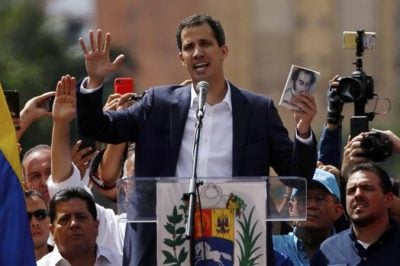The Failure of Guaido’s Constitutional Claim to the Presidency of Venezuela

The three constitutional articles invoked by Juan Guaido to legitimise his presidency are: 233, 333, and 350. The latter two are broad affirmations of democracy and constitutionality, silent on Presidential lines of succession. Guaido’s claim rests entirely on 233; presented here in full:
The President of the Republic shall become permanently unavailable to serve by reason of any of the following events: death; resignation; removal from office by decision of the Supreme Tribunal of Justice; permanent physical or mental disability certified by a medical board designated by Supreme Tribunal of Justice with the approval of the National Assembly; abandonment of his position, duly declared by the National Assembly; and recall by popular vote.
When an elected President becomes permanently unavailable to serve prior to his inauguration, a new election by universal suffrage and direct ballot shall be held within 30 consecutive days. Pending election and inauguration of the new President, the President of the National Assembly shall take charge of the Presidency of the Republic.
When the President of the Republic becomes permanently unavailable to serve during the first four years of this constitutional term of office, a new election by universal suffrage and direct ballot shall be held within 30 consecutive days. Pending election and inauguration of the new President, the Executive Vice-President shall take charge of the Presidency of the Republic.
In the cases describes above, the new President shall complete the constitutional term of office.
If the President becomes permanently unavailable to serve during the last two years of his constitutional term of office, the Executive Vice-President shall over the Presidency of the Republic until such term is completed.
The opening paragraph envisions six scenarios whereby a President might no longer serve. The next paragraph sets out protocols to be followed should a President-elect become unavailable to serve pre-inauguration. The third paragraph contemplates presidential vacancies during the first four years of office. The last paragraph deals with presidential vacancies in the final two years of office.
Of the six scenarios envisioned (death, resignation etc.) Guaido relies on “abandonment of his position.” This clearly never happened. Maduro isn’t gone. He’s still there. “Abandonment” conjures images of a President fleeing on a plane freighted with bullion. Maduro, however, currently occupies presidential offices and residences. There has been no abandonment.
“Abandonment” is spun to mean “usurpation.” When did this occur? Are they suggesting that at no time since April 19, 2013 has Maduro ever been President? If Maduro was President, then he must have farcically usurped himself. “Usurp” typically means take power away from someone. There has been no usurpation.
If a President becomes unavailable to serve in the first four years of his term, then the Vice-President takes over and calls an election. If the calamity occurs in the last two years of the presidential term then the VP serves out the fallen President’s term.
Guaido, as head of the National Assembly, only becomes involved when the vacancy occurs in the twilight zone between election and inauguration. This definitely did not happen here. Moreover, by citing Article 233 Guaido implies there was a recent (lawful) election. Finally, Guaido’s January 23 self-anointment occurred 13 days after Maduro’s January 10 inauguration. He missed the boat.
Pursuant to 233, if the head of the National Assembly becomes Acting President he must immediately call an election; and serve only until the winner of that election is inaugurated. The Western media (and Wiki) butcher 233’s second paragraph, leaving only opening and closing clauses; discarding any mention of “election.” Guaido should have, at the moment of self-anointment, announced an election for February 22. For the head of the National Assembly to assume Presidential powers, and then fail to call an election so as to keep those powers, would be flagrantly unconstitutional.
This thread becomes rejoicefully rich considering the EU’s position. They are demanding Maduro call an election; …or else they will recognise Guaido. Can Maduro call an election if he is not President? By demanding Maduro hold an election they are recognising Maduro as President. If Maduro is President he has no obligation to call snap elections to satisfy foreign governments. Alternatively, if Guaido became President he would have an explicit, unavoidable constitutional obligation to call an immediate election.
Guaido is the figure-head of a coup attempt orchestrated by foreign powers without a constitutional leg to stand on.
*
Note to readers: please click the share buttons above. Forward this article to your email lists. Crosspost on your blog site, internet forums. etc.

